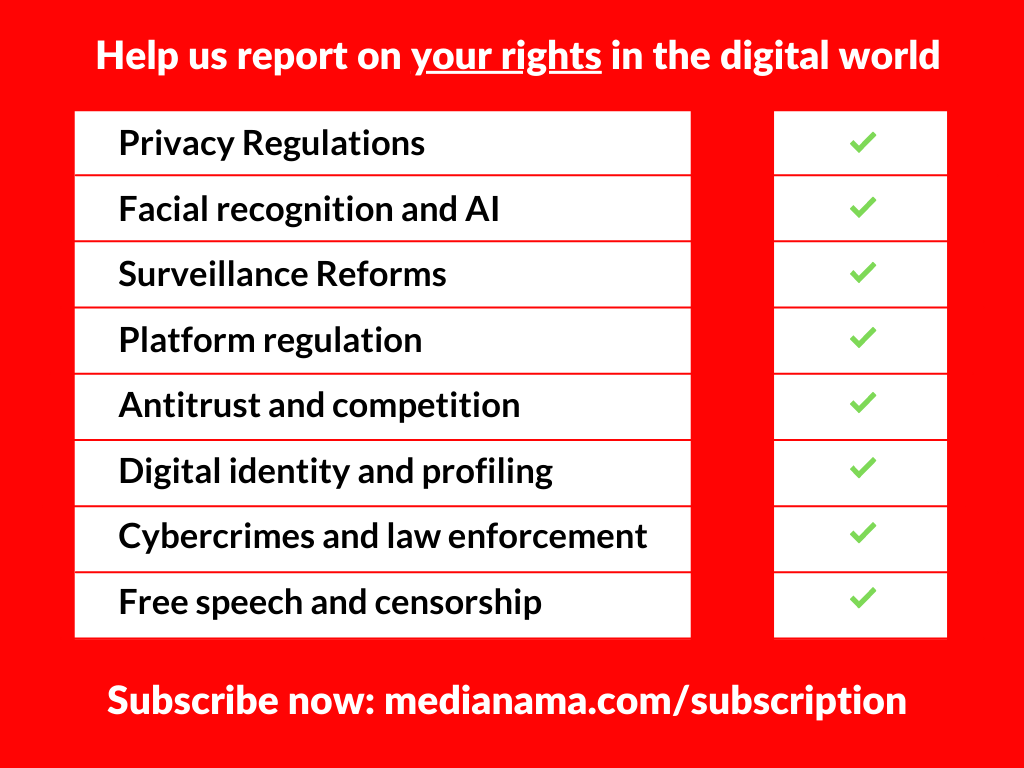“What is surprising to us is this is just for such a routine story,” M.K. Venu, a Founding Editor of The Wire told MediaNama, reacting to Twitter’s email that the Ministry of Electronics and Information Technology has flagged a tweet from The Wire “for violating the Information Technology Act”.
On 29th April, the publication received an email from Twitter saying that the micro-blogging site had received a ‘request’ from MeitY taking exception to a tweet. While Twitter said that it was not going to take action on the tweet ‘at this time’, it was their policy to notify users when they receive such requests from law enforcement or government entities.
The grounds of MeitY’s objections were not mentioned in the email and a Twitter spokesperson declined to comment on the matter. Notably, the Information Technology (IT) Rules 2021 are currently being challenged in multiple courts out of fear that the legislation grants the government excessive powers in censoring news media. Further, an intense stand-off had also taken place between Twitter and the Central government last year, over similar defiance of such direction
Dear reader, we urgently need to build capacity to cover the fast-moving tech policy space. For that, our independent newsroom is counting on you. Subscribe to MediaNama today, and help us report on the policies that govern the internet.
What did The Wire’s tweet contain?
The tweet briefly described their report on accusations of voter fraud levied by Akhilesh Yadav, Samajwadi Party chief, during the Uttar Pradesh State Assembly Elections and then linked out to the report. Both the tweet and the report are dated 8th March, 2022.
Below is the tweet, in question:
Ahead of the counting of votes on Thursday, March 10, Samajwadi Party chief Akhilesh Yadav has raised sensational claims of “EVM fraud” and “vote theft” in Uttar Pradesh’s Varanasi. https://t.co/nasHIWGdVE
Was The Wire’s tweet unlawful?
Not according to Tanmay Singh, counsel at Internet Freedom Foundation, “If you look at all of the grounds that I have mentioned under Section 69A (of the IT Act) and if you look at that tweet again, it doesn’t seem like any of those grounds have been attracted because it is just tweeting out a news story,” he told MediaNama.
What are the government’s powers related to takedowns?
Section 69A of the IT Act, 2000 empowers the government to order the takedown of any content online, “in the interest of sovereignty and integrity of India, defence of India, security of the State, friendly relations with foreign States or public order or for preventing incitement to the commission of any cognizable offence relating to above.” A failure to comply with such an order could open an intermediary to legal battles, as it will lose its indemnity against unlawful third party content i.e safe harbour protections.
How did the government issue such an objection to The Wire’s tweet?
A lack of transparency around such orders insures the government’s directions for takedown may well extend beyond such reasons as well, Tanmay Singh, counsel at Internet Freedom Foundation, told MediaNama.
“MeitY finds it very easy to send these requests or orders for take down or anything else because even when they don’t comply with the law- you saw the grounds that are mentioned in Sec. 69 of the Act- they (the ministry) knows that even when their requests go beyond those very limited grounds in the Act nothing will ever happen to them, because of the opacity that they maintain they are held to a very low standard of accountability.” — Tanmay Singh, IFF
How can Twitter legally refuse to comply with such directions?
The answer to this is not very clear, according to Singh. The legality of Twitter’s defiance of the direction may lie in the exact wording of the ‘request’ it says it received, he says.
‘Two kinds of orders that they (intermediaries like Twitter) have to comply with- One is a court order, the other is an order under 2009 Blocking Rules which flows from Section 69 of the IT Act. That will take a certain form, it will have to comply with certain procedural safeguards for example the grounds under Section 69. However MeitY can still put in a request like a user report. It is possible that the government did not word it as an order, they may have sent in a request saying “please take it down”,’ Singh told MediaNama.
However, according to Twitter’s legal request FAQs Twitter checks the following indications upon receiving a ‘legal request’.
- If a request tries to ‘chill or restrict freedom of expression’
- If a request ‘raises other Twitter policy concerns (e.g., accounts belonging to journalists, verified accounts, or accounts containing political speech)’
At this point, the platform may also ask the requester for additional context before taking action on an account, or pushing back on the request in its entirety due to various circumstances, it says. Meanwhile, the FAQs say, Twitter informs the user in question so they may take an informed decision on if they want to take down the content, respond directly to the requester, or seek legal advice to challenge such a request before it is actioned.
Elon Musk’s plan for the platform would involve complying with local law
The development raises questions on how the platform might deal with such situations once its new owner, Elon Musk’s principle of free speech is fully in place in its policies.
Musk, who acquired Twitter as part of $44 Billion deal in April, has often said that he would want the platform to abide by principles of free speech going forward, including compliance by local law in foreign jurisdictions that the platform operates in.
By “free speech”, I simply mean that which matches the law.
I am against censorship that goes far beyond the law.
If people want less free speech, they will ask government to pass laws to that effect.
Therefore, going beyond the law is contrary to the will of the people.
— Elon Musk (@elonmusk) April 26, 2022
However, laws in different jurisdictions, could also in turn lead to interference with free speech- in which case, would a Musk-led Twitter comply with government legal requests?
Timeline of Twitter’s stand-off with the government
Twitter has tried to push back against such government orders in the past but that hasn’t ended well for the platform. Here’s a brief look at what went down over a seven-month period in 2021:
February: Twitter suspends the accounts of The Caravan, Kisan Ekta Morcha, and Prasar Bharti CEO Shashi Shekhar on February 1 after receiving a legal request from MeitY.
- On February 2, Twitter reverses the suspension of all these accounts. TIME magazine reported that these accounts were targeted because of tweets posted on farmer protests that were being held at the time.
- MEITY sends an 18-page notice to Twitter over non-compliance with its takedown requests.
- On February 4, MEITY sends another takedown request with a list of 1,178 accounts to be blocked
- Twitter blocks 500 accounts but refuses to block others on grounds of ‘free expression’
- On February 10, MeitY holds a meeting with Twitter VP for Global Public Policy Monique Meche and Legal VP and Deputy General Counsel Jim Baker, both US-based executives, as per a press release. In this meeting, MeitY urges Twitter to follow Indian laws (and by extension, comply with takedown requests).
May: On May 21, Twitter labels a tweet by BJP spokesperson Sambit Patra as ‘manipulated media’.
- The government asks Twitter to remove the tag as the matter is under investigation
- On the same day, Delhi Police sends a notice to the social media platform asking it to share information in connection to its Congress toolkit investigation.
- The next day, Delhi Police visits Twitter’s office in Lado Sarai in New Delhi and in Gurgaon to serve a notice in connection to the toolkit probe.
- On May 27, Twitter issues a statement expressing concern for its employees after the usage of “intimidation tactics by the police” and the “potential threat to freedom of expression” of the people it serves. It also asks for a three-month extension on the enactment of the IT Rules 2021, after saying it received a legal notice regarding its non-compliance.
- MeitY and Delhi Police condemn Twitter’s statement as attempts at ‘fear-mongering’ and defaming India.
- On May 28, a petition is filed against Twitter for non-compliance with the IT Rules in the Delhi High Court.
June: Court proceedings get underway as Twitter tries to become compliant with the IT Rules. Multiple cases are filed against the platform, including India Managing Director Manish Maheshwari, related to alleged unlawful content on the platform.
August: Indian government tells Delhi High Court Twitter is in compliance with the IT Rules.
This post is released under a CC-BY-SA 4.0 license. Please feel free to republish on your site, with attribution and a link. Adaptation and rewriting, though allowed, should be true to the original.
Also Read:
- Twitter Takes Down Tweets From MP, MLA, Editor Criticising Handling Of Pandemic Upon Government Request
- Twitter Vs Indian Government: Implications For India
Have something to add? Subscribe to MediaNama here and post your comment.






























